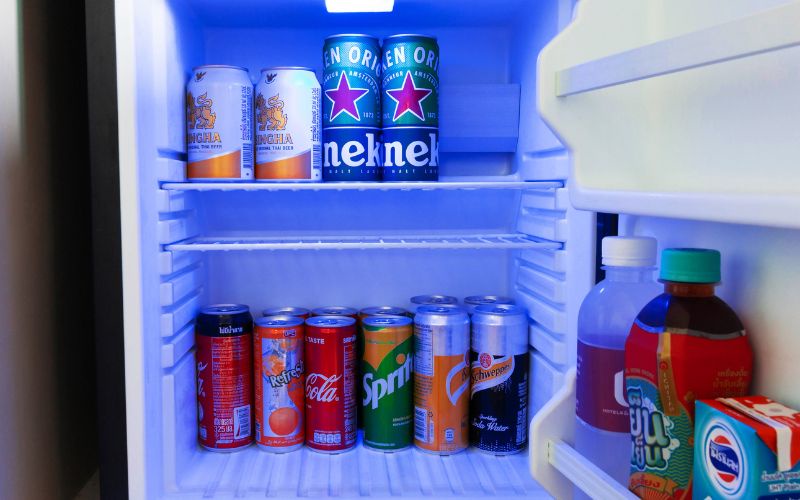In the fast-paced world of food service and hospitality, commercial fridges serve as the backbone of operations, ensuring the seamless storage and preservation of perishable goods. From bustling restaurants and bustling kitchens to bustling cafes and food retail establishments, the demand for reliable and efficient refrigeration solutions is ever-present. In this comprehensive guide, we delve deep into the world of commercial fridges, exploring their various types, functionalities, and key considerations for making an informed purchasing decision.
Types of Commercial Fridges
Walk-In Coolers
Providing Ample Storage Space: Walk-in coolers offer vast storage capacity, making them ideal for large-scale foodservice establishments and commercial kitchens with high-volume storage requirements. These refrigeration units are designed to accommodate pallets, shelves, and food carts, providing ample space for storing a wide range of perishable goods.
Reach-In Refrigerators
Optimizing Accessibility: Reach-in refrigerators are compact, upright units designed to maximize accessibility and convenience in commercial kitchens. With adjustable shelves and easy-to-open doors, these fridges allow for efficient organization and retrieval of food items, making them a popular choice for restaurants, cafes, and food retail outlets with limited space.
Undercounter Fridges
Space-Saving Solutions: Undercounter fridges are compact refrigeration units that fit seamlessly beneath countertops or worktops, making them an excellent space-saving solution for small-scale foodservice operations or establishments with limited kitchen space. These versatile units are commonly used to store beverages, condiments, and chilled food items within arm's reach of food preparation areas.
Key Considerations When Purchasing Commercial Fridges
Temperature Control and Regulation
Ensuring Food Safety: Temperature control and regulation are paramount in commercial refrigeration to ensure the safety and quality of perishable goods. Look for fridges equipped with advanced temperature management systems, digital displays, and temperature alarms to maintain precise temperature control and prevent food spoilage.
Energy Efficiency
Sustainable Solutions: Energy efficiency is a critical consideration for businesses looking to minimize their environmental impact and reduce operating costs. Choose ENERGY STAR certified fridges with energy-saving features such as LED lighting and efficient cooling systems to optimize energy consumption and lower utility bills.
Durability and Reliability
Investing in Quality: Commercial fridges are a significant investment, so it's essential to choose models renowned for their durability and reliability. Prioritize brands with a reputation for manufacturing high-quality refrigeration equipment constructed from robust materials such as stainless steel, ensuring long-term performance and longevity.
Storage Capacity
Matching Capacity to Demand: Assess your specific storage requirements and choose a fridge with adequate storage capacity to accommodate your needs without overcrowding or compromising accessibility. Consider factors such as the volume of food items you need to store and the available space in your kitchen or storage area.
Budget Considerations
Balancing Cost and Quality: While quality and performance are paramount, it's also important to consider your budgetary constraints when purchasing a commercial fridge. Evaluate the total cost of ownership, including upfront purchase price, ongoing maintenance expenses, and energy consumption, to find the most cost-effective option that meets your needs without sacrificing quality.
Conclusion
In conclusion, investing in the right commercial fridge is essential for businesses operating in the food service and hospitality industry. By considering factors such as temperature control, energy efficiency, durability, and storage capacity, you can make an informed purchasing decision that aligns with your specific needs and requirements. Remember to prioritize quality, reliability, and long-term performance when selecting a commercial fridge to ensure the success and efficiency of your operations. For more details visit us at Oz Coolers.
FAQs
Q: How often should I clean and maintain my commercial fridge? A: It's recommended to clean and sanitize your commercial fridge at least once a week to prevent bacterial growth and ensure food safety. Additionally, regular maintenance checks should be conducted to inspect components such as door seals, condenser coils, and temperature settings for optimal performance.
Q: Can I use a commercial fridge for storing both raw and cooked food items? A: While commercial fridges are designed to store perishable goods safely, it's important to separate raw and cooked food items to prevent cross-contamination and maintain food hygiene standards. Use designated storage areas or shelves for raw meats, poultry, and seafood to minimize the risk of bacterial contamination.
Q: What is the optimal temperature range for storing perishable goods in a commercial fridge? A: The optimal temperature range for storing perishable goods in a commercial fridge is between 34°F to 40°F (1°C to 4°C). This temperature range helps slow down bacterial growth and preserves the freshness and quality of food items for an extended period.
Q: How can I maximize the energy efficiency of my commercial fridge? A: To maximize energy efficiency, ensure proper airflow around the fridge by maintaining adequate clearance space and avoiding blocking vents or air circulation channels. Additionally, regularly clean and defrost the fridge to prevent ice buildup and optimize cooling efficiency.
Q: Are there any government regulations or standards for commercial fridge operation and maintenance? A: Yes, several government agencies, such as the Food and Drug Administration (FDA) and the Occupational Safety and Health Administration (OSHA), have established regulations and guidelines for the operation and maintenance of commercial refrigeration equipment. It's essential to familiarize yourself with these regulations and ensure compliance to uphold food safety and workplace safety standards.
Q: Can I retrofit my existing commercial fridge with energy-efficient features? A: Depending on the model and age of your commercial fridge, retrofitting it with energy-efficient features may be possible. Consult with a professional refrigeration technician or contact the manufacturer to explore retrofitting options and upgrades that can enhance the energy efficiency of your existing fridge.


No comments yet